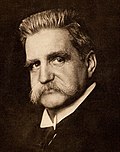Top Qs
Timeline
Chat
Perspective
1921 Swedish general election
From Wikipedia, the free encyclopedia
Remove ads
Early general elections were held in Sweden between 10 and 26 September 1921,[1] the first in Sweden under universal suffrage. The Swedish Social Democratic Party remained the largest party, winning 93 of the 230 seats in the Andra kammaren of the Riksdag. Party leader Hjalmar Branting formed his second government.
Remove ads
Background
Before the elections in 1921 the Social Democratic Left Party of Sweden accepted Lenin's April Theses and was renamed the Communist Party of Sweden, whilst a breakaway faction of some 6,000 socialists who had been excluded by the communists as "non-revolutionary elements" kept the previous name.
Electoral system

In 1921 universal suffrage was introduced for men and women,[2] aged 23 and over. However, a significant number of people were still unable to vote, including those who had been declared incapable of managing their own affairs by a court of law. This limitation of the franchise disappeared only in 1989 when the Riksdag abolished incapacitation.[3] In the 1921 elections incapacitation meant that only 55% of the population could vote.[3]
Remove ads
Results
The five first women MPs were elected, with Kerstin Hesselgren in the Första kammaren and Nelly Thüring (Social Democrat), Agda Östlund (Social Democrat) Elisabeth Tamm (liberal) and Bertha Wellin (Conservative) in the Andra kammaren.[4]
Aftermath
As a result of the election Prime Minister Oscar von Sydow resigned and was replaced by Hjalmar Branting who also became Foreign Minister of Sweden. Although the non-socialist parties held a majority in the second chamber, Branting was able to hold office through being the largest party and reaching cross-ideological consensus in the chamber. The centre-right majority took over the governing in 1923 under Ernst Trygger following a parliamentary loss for the Social Democrats over unemployment protection.
Alongside the universal franchise reform, a parliamentary system of government developed and gained acceptance, implying that the government requires the Riksdag's confidence and support for all major decisions. From 1921 all major treaties with foreign states had to be approved by the Riksdag, and the two chambers of the Riksdag now elected their own Speakers along with two deputy speakers each.
Remove ads
Notes
- Total seats of Farmers' League and Farmers' Association
References
Wikiwand - on
Seamless Wikipedia browsing. On steroids.
Remove ads








